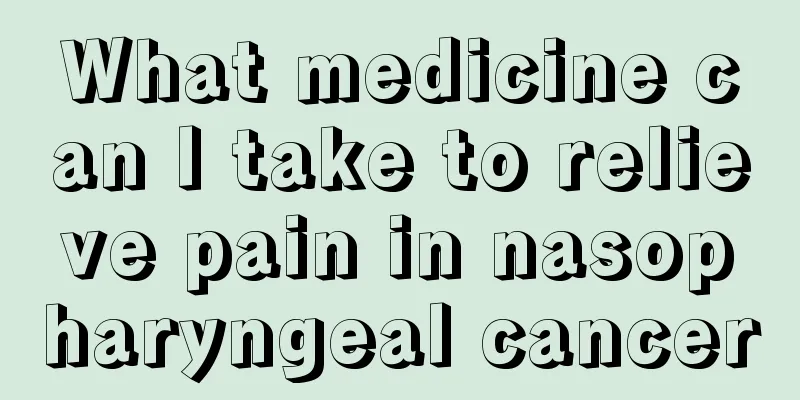What medicine can I take to relieve pain in nasopharyngeal cancer

|
Nasopharyngeal carcinoma patients can choose drug therapy, radiotherapy or surgical intervention to relieve pain. The specific method should be determined according to the severity of the disease and the doctor's advice. Drug therapy includes non-steroidal anti-inflammatory drugs, opioids and auxiliary analgesics; radiotherapy and surgery are suitable for specific situations. 1. Drug therapy is a common way to relieve pain in nasopharyngeal carcinoma. Nonsteroidal anti-inflammatory drugs such as ibuprofen, diclofenac sodium and acetaminophen are suitable for mild pain and relieve discomfort by inhibiting inflammatory response. Opioids such as morphine, oxycodone and fentanyl are suitable for moderate to severe pain and directly act on the central nervous system to relieve pain. Auxiliary analgesics such as gabapentin, pregabalin and amitriptyline are often used for neuropathic pain and work by regulating nerve signal transmission. 2. Radiotherapy is one of the effective means of relieving pain in nasopharyngeal carcinoma. High-energy rays kill cancer cells, reduce tumor size, and reduce pressure and pain on surrounding tissues. Radiotherapy is suitable for patients with large local tumors or those that invade nerves. It usually requires multiple treatments to achieve the best results. Side effects such as skin reactions and fatigue may occur during radiotherapy, and it must be performed under the guidance of a doctor. 3. Surgical intervention is suitable for specific situations. For patients whose tumors compress important structures or cause severe pain, surgical removal of the tumor can quickly relieve symptoms. Surgical methods include endoscopic sinus surgery, open surgery, and minimally invasive surgery. The specific choice depends on the location of the tumor and the patient's physical condition. Radiotherapy or chemotherapy may be needed after surgery to reduce the risk of recurrence. Pain relief for nasopharyngeal carcinoma patients requires comprehensive consideration of the condition, pain level, and patient tolerance to develop an individualized treatment plan. Drug therapy is the basis, and radiotherapy and surgery are suitable for specific situations. Patients should have regular follow-up visits and adjust treatment plans in a timely manner to ensure that pain is effectively controlled. Maintaining a good attitude and a healthy lifestyle will help improve treatment outcomes and quality of life. |
<<: Symptoms of invasive lung cancer
>>: How to treat nasopharyngeal carcinoma in the middle and late stages
Recommend
What are the dangers of eye pterygium
Many people become very panicked when they find p...
Diet for lung cancer
Lung cancer patients should actively seek treatme...
What to do if a chicken pecks you and causes bleeding
In the city, except in some special vegetable mar...
How big is the genetic factor in bone cancer
Bone cancer is the most painful cancer for patien...
How can people with diabetes prevent pancreatic cancer
The incidence of pancreatic cancer in my country ...
The reason why pancreatic cancer is painless in the late stage
Malignant tumors are becoming more and more commo...
Drinking soft drinks may cause prostate cancer. A must-have guide to eating and drinking correctly to prevent cancer
The prostate is one of the most important reprodu...
What happens if beer is mixed with betel nut
Beer is a kind of alcoholic beverage that is deep...
Effects of chrysanthemum and rock sugar water
We often drink chrysanthemum tea in our daily lif...
How to treat blood in stool_How to treat blood in stool
Blood in the stool is a very common health proble...
Do clothing dyes cause bladder cancer? How to prevent bladder cancer
The incidence of bladder cancer in men is higher,...
The use of folic acid_What is folic acid for
Folic acid is a very common element. Many mothers...
Pee smells bad
Generally, the smell will be stronger when defeca...
How is gingival osteosarcoma formed
Gingival osteosarcoma is a rare malignant tumor c...
What are the common symptoms of ovarian cancer?
Ovarian cancer is also a common disease in life, ...









